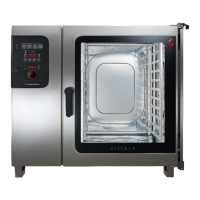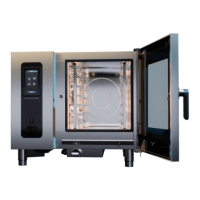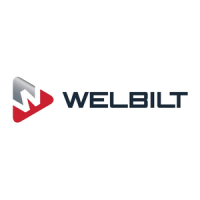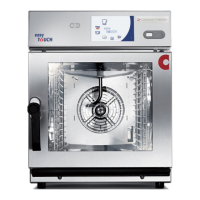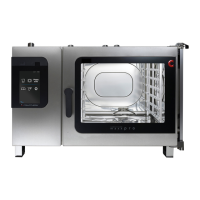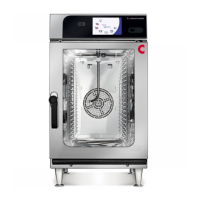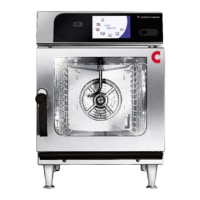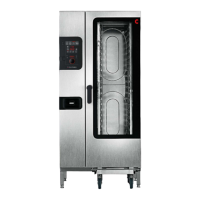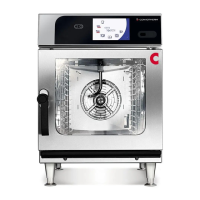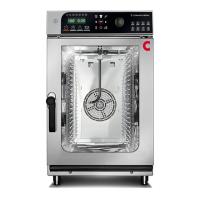Do you have a question about the Welbilt Merrychef eikon e1s and is the answer not in the manual?
Details Welbilt's commitment to environmental management and procedures.
Locates and explains the information found on the appliance's nameplate.
Covers basic safety codes, PPE, and installation compliance with regulations.
Essential precautions for using electrical appliances, covering burns, shock, fire, and exposure.
Details restrictions on use, safe handling of liquids, and general operating precautions.
Summarizes design features, operational hazards, and essential safety devices for user protection.
Identifies key appliance parts and their functions, including safety devices.
Explains the function of safety devices and provides actions for checking their operation.
Identifies specific points of hazard during appliance operation like heat, steam, and live components.
Specifies the intended professional/commercial use and materials not allowed for heating.
Outlines the necessary qualifications and tasks for Facility Managers, Chefs, Users, and Service Technicians.
Details PPE, installation location requirements, space clearances, and fire/heat risks.
Covers risks from lifting, crushing, sharp edges, trapping, and electric shock during installation.
Specifies PPE and safety precautions for preparing the appliance for its first use.
Covers general operating rules, restrictions, and safe use instructions for the appliance.
Identifies risks of burns from hot surfaces, scalding from steam, excessive microwave energy, and radio interference.
Details risks of electric shock, burns, scalding, and irritation from cleaning agents.
Covers PPE, risks of moving the appliance, and rules for safe trolley use during service.
Details PPE, general precautions, and risks when disconnecting and disposing of the appliance.
Introduces the e1s microwave combination oven and its cooking capabilities.
Identifies and describes the function of each part of the e1s oven.
Lists and describes the cook plate, air filter, and paddle provided with the oven.
Provides step-by-step instructions for unpacking and taking the appliance off the pallet.
Details minimum space requirements, clearances, and environmental conditions for installation.
Outlines safety rules, grounding, and equipment regulations for electrical connection.
Covers circuit breaker types, low impedance supply, single-phase electrical specs, and bonding.
Guides users through fitting the air filter, inserting the cook plate, and turning the oven on/off.
Explains how to configure date, time, alarms, temperature, and oven time settings.
Provides guidelines on permitted cooking utensils and containers for microwave combination ovens.
Details the layout, icons, and functions of the main menu and the appliance keyboard.
Step-by-step guide on how to cook using the appliance, from profile selection to food removal.
Details how to select and run cooking profiles using the quick serve mode.
Guides users through selecting and running cooking profiles in the full serve mode.
Explains how to select, edit, and manage cooking profiles for the Press&Go menu.
Instructions on how to change the cavity temperature and edit temperature labels.
Step-by-step guide on creating new cooking profiles with time, power, and fan speed settings.
Details how to view, edit, and move cooking profiles within groups or lists.
Explains how to move profiles within lists and create new groups with pictures and names.
Guides on adding profiles to groups and deleting entire cooking profile groups.
Instructions on how to rename existing cooking profile groups.
Details the process of changing various appliance settings like language, date, time, and passwords.
Explains how to select operating modes (Quick Serve, Full Serve, Manual) and change language.
Covers changing temperature sets, editing labels, adding new temperatures, and unit measurement.
Accessing service info, error logs, and viewing cooking profile usage counters.
Step-by-step guide to setting the appliance's date and time accurately.
Explains how to adjust volume levels, tone, and keypad sound settings.
Guides on setting timed temperature profiles for specific days and times.
Instructions for loading firmware and recipes via USB, including important notes on data handling.
Covers setting temperature bands for stability and changing access/service passwords.
Details how to enable, disable, and set the time delay for the appliance's screen saver.
Explains the process for safely cooling down the oven before cleaning, servicing, or repairing.
Details daily tasks, cleaning items, chemicals, instructions, and process stages for maintenance.
Explains how to turn off the oven and leave the door ajar for moisture escape.
Provides warranty claim requirements and contact details for customer service.
Summarizes dimensions, weight, electrical specs, power, noise, and regulatory standards.
Provides detailed drawings showing the oven's dimensions from various views.
Guides on checking appliance condition and entering Service Mode for diagnostics.
Details functions within Service Mode: Error Log, Oven Counters, Visual View, Demo Mode, Temp Comp.
Explains how to access and interpret error codes from the appliance's error log.
Provides steps to copy error logs from the appliance onto a USB memory stick.
Details how to check oven component usage (counters) and perform health checks via Visual View.
Describes how to check the door microswitches, cooling fan, and convection fan operation.
Details how to test the magnetron and heater for correct operation and temperature.
Guides on recalibrating the touchscreen if it behaves inconsistently.
Lists error codes, conditions, triggers, causes, system responses, and actions for troubleshooting.
Provides a detailed table of error codes, their meanings, and recommended actions for resolution.
Lists various tests service engineers can perform and the equipment required for them.
Details the procedure for measuring the magnetron's microwave power output.
Provides instructions for performing a microwave leakage test to ensure safety compliance.
Guides on measuring and calibrating the cavity temperature sensor and SRB.
Details the soak test procedure to check overall cavity functionality and for leaks.
Explains the recommission tests to ensure the appliance works correctly after service or repair.
Lists essential checks after service/repair before connecting to power and finishing service reports.
Details requirements and procedures for testing the high voltage transformer's windings and insulation.
Explains how to test the continuity and insulation resistance of the high voltage capacitor.
Details requirements and procedures for testing the magnetron's continuity.
Covers tests for convection fan motor, speed controller, and LED status display.
Guides on updating appliance firmware using USB, covering manual and automatic methods.
Details safe working practices and eligibility for component replacement.
Highlights risks of electric shock, microwave emissions, fire, and smoke when working on live parts.
Illustrates and labels the various internal components of the appliance.
Lists each component with its name, function, and location within the appliance.
Provides instructions and tool requirements for removing and refitting the appliance casing panels.
Details the procedure for removing and fitting the appliance door assembly and its seal.
Step-by-step guide for replacing the magnetron, including component location and preparation.
Instructions for removing and fitting the cooling fan, including component location and tools.
Details the procedure for removing and fitting the QTS assembly, including PM module handling.
Provides instructions for removing and fitting the SRB, including component location and PM module.
Details how to remove and fit the touchscreen overlay, including adhesive removal.
Guides on adjusting door microswitches after hinge replacement for proper door closure detection.
Instructions for removing and fitting the impinger plate within the oven cavity.
Details the procedure for removing and replacing the stirrer, including partition plate and gasket.
Guides on removing and fitting the stirrer motor, including thread locking.
Provides instructions for replacing the convection fan motor and heating element.
Details requirements and steps for removing and fitting the high voltage transformer.
Instructions for removing and fitting the convection fan motor speed controller board.
Describes equipotential bonding, EMC filter, diode, cavity sensor, and exhaust pipe.
Illustrates and identifies components on the QTS circuit board assembly.
Illustrates and identifies connections on the SRB circuit board.
Presents comprehensive circuit diagrams for the appliance's electrical systems.
| Model | eikon e1s |
|---|---|
| Power Supply | Electric |
| Frequency | 50/60 Hz |
| Programs | Up to 1024 |
| Timer | Yes |
| Type | High Speed Oven |
| Cooking Technology | Convection |
| Control Type | Touchscreen |
| Voltage | 220-240 V |
| Cooking Modes | Convection |
